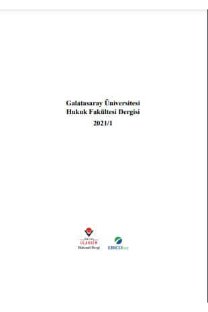Fikri Mülkiyet Haklarının AİHM Kararlarına Göre Korunması
Geçtiğimiz yüzyılda ekonomik faaliyetlerin niteliğinde yaşanan değişimle beraber, devletler iç hukuklarında ticari hayatı ilgilendiren yeni düzenlemeler yapmak durumunda kalmıştır. Söz konusu düzenlemelerin, ticari gelişimde rol oynayan sair etkenlerin teşvik edilmesi amacına yöneldiği ifade edilebilir. Bu doğrultuda özellikle üretim faaliyetlerinin makineleşmesi, serileşmesi, otomatikleşmesi ve entegrasyonu gibi konularda çalışma yapılarak ilerleme sağlanması hedeflenmiştir. Üretime, ticarete ve ekonomiye katkı sağlayabilecek fikir sahiplerinin ödüllendirilmesinin ve hukuken korunmasının pragmatik önemi burada yatmaktadır. İşte fikri mülkiyet hukuku çatısı altında yer alan sınai mülkiyet kavramı, üretim açısından önemli olan buluş ve tasarım gibi birtakım değerler açısından gündeme gelir. Fakat belirtilmelidir ki fikri ürünler; ticari meta olarak değerlendirilebilmelerinin yanında, fikir sahipleri için aynı zamanda “manevi bir değer” de ifade eder. Nitekim sinema yahut tiyatro senaryosu gibi eserler, yüksek miktarda ekonomik değeri haiz olabildiği gibi manevi açıdan da önem ifade etmektedir. Fikri mülkiyet hukuku, bu doğrultuda sanatı da gözetmiş ve içerdiği telif hakkı ve komşu hak kavramları ile sanatçıyı koruma altına almıştır. Bu çalışmanın birinci bölümünde, yukarıda örnekleri verilen hakların klasik mülkiyet hakkı düşüncesinden farklı olan özellikli yanları kısaca izah edilmiş ve ikinci bölümde ise fikri mülkiyet haklarının AİHM yargılamalarında yararlanmakta olduğu koruma açıklanmıştır.
The Protection for Intellectual Property Rights Before the ECHR
Due to the transformation of economic activities in the last century, governments have been forced to make new regulations concerning commercial life in their domestic law. It is possible to argue that the reason behind making some of the said regulations is to exhortate the factors that play a role in commercial development. In this context, making innovations and finding new methods in mechanization, serialization, automation and integration in stage of production is aimed. The pragmatic importance of awarding and granting legal protection to the intellectual properties’ owners who own an intellectual asset that can contribute to production of goods, trade and economy lies here. The concept of industrial property, which is under the umbrella of intellectual property law, usually comes up in terms of assets such as inventions or designs which are important to production. However, it should be noted that being deemed as a commercial commodity, an intellectual asset can also has a moral value for its owner. As a matter of fact, artworks such as theatre scripts or photos can have both a high economic and high moral value. Intellectual property law, in this respect, considers also the art and protects the artist with the scope of copyright and neighboring right concepts. In the first part of this study, the features of the rights given above, which are different from the classical concept of property rights, are briefly explained and in the second part, the protection of intellectual property rights before of the ECHR is explained.
___
ALTAN Alparslan, Mülkiyet Hakkı, Güvencesi ve Koruması, Yayınlanmamış Doktora Tezi, Ankara, Gazi Üniversitesi SBE Kamu Hukuku Anabilim Dalı, 2008.ÇOBAN Ali Rıza, “Mülkiyet Bir İnsan Hakkı Mıdır?”, Piyasa Dergisi, S.12-Güz, 2004, ss. 295-320.
DRAHOS Peter, “Intellectual Property and Human Rights”, Intellectual Property Quarterly, No:3, 1999, ss. 349-371.
GEIGER Cristophe / IZYUMENKO Elena, Intellectual Property Before the European Court of Human Rights, Paper No: 2018-1, Center for International Intellectual Property Studies of Universite de Strazbourg, Strazbourg.
GEMALMAZ Haydar Burak, Avrupa İnsan Hakları Sözleşmesinde Mülkiyet Hakkı, Beta Yayınları, İstanbul, 2017.
GEMALMAZ Mehmet Semih, Ulusalüstü İnsan Hakları Hukukunun Genel Teorisine Giriş, C.2, 8. Bs., Legal Yayıncılık, İstanbul, 2012.
GÖZLER Kemal, “Sigara İçme Özgürlüğü ve Sınırları: Özgürlüklerin Sınırlandırılması Problemi Açısından Sigara Yasağı”, Ankara Barosu Dergisi, Yıl 47, S.1, Ocak 1990, ss. 31-67.
GRIFFITHS Jonathan / MCDONAGH Luke, “Fundamental rights and European IP law-the case of art 17(2) of the EU Charter”, Constructing European Intellectual Property Achievements and New Perspectives, Ed. Christophe Geiger, 2013, ss. 75-93.
HARMS L.T.C., The Enforcement of Intellectual Property Rights: A Case Book, 3rd Edition, WIPO, 2012.
ÖZÇELİK Anıl, Avrupa Birliği Hukukunda Patent Hakkı ve Korunması, Yayınlanmamış Yüksek Lisans Tezi, Ankara, Gazi Üniversitesi SBE Özel Hukuk Anabilim Dalı, 2009.
ÖZTUNALI Duygu, Eser Sahibinin Manevi Hakları, Yayınlanmamış Yüksek Lisans Tezi, İstanbul, İstanbul Üniversitesi SBE Özel Hukuk Anabilim Dalı, 2010.
ROZHKOVA Marina Alexandrovna / AFANASİEV Dmitry Victorovich, “The Matters of Intellectual Property in the Practice of the European Court of Human Rights”, Mediterranean Journal of Social Sciences, Vol.6, No. 3, May 2015, ss. 241- 248.
SIMON Bradford S., “Intellectual Property and Traditional Knowledge: A Psychological Approach to Conflicting Claims of Creativity in International Law”, Berkeley Technology Law Journal, Vol. 20, No. 4 (Fall 2005), ss. 1613-1684.
SOYSAL Tamer, “İnternet Alan Adlarının ‘Hak’ Niteliği ve AİHM’in PAEFFGEN/Almanya Kararı Çerçevesinde Alan Adları Üzerinde Mülkiyet Hakkı Tesisi”, Adalet Dergisi, No:54, 2016, ss. 1-25.
STENGEL Daniel, “Intellectual Property in Philosophy, Archives for Philosophy of Lawand Social Philosophy, Vol. 90, No:1, 2004, ss. 20-50.
SULUK Cahit / KARASU Rauf / NAL Temel, Fikri Mülkiyet Hukuku, Ankara, Seçkin Yayıncılık, 2017.
ŞEKERBAY Cennet Alas, Fikir ve Sanat Eserleri Hukukunda Manevi Haklar, Yayınlanmamış Doktora Tezi, Gazi, Ankara, Üniversitesi SBE Özel Hukuk Anabilim Dalı, 2014.
TATAR Dilek Buket, Mülkiyet ve Fikri Mülkiyetin Felsefi Temelleri, Yayınlanmamış Yüksek Lisans Tezi, Ankara, Gazi Üniversitesi SBE Kamu Hukuku Anabilim Dalı, 2013.
TEKİNALP Ünal / ÇAMOĞLU Ersin, Sınai Mülkiyet Kanunu, İstanbul, Vedat Kitapçılık, 2017.
VENERUCCI Francesca, A Comperative Study of the CJEU and ECtHR Approaches on Intellectual Property: Unity or Division?, Tesi di Laurea, Università Commerciale Luigi Bocconi Scuola di giurisprudenza, 2015-2016.
WELKOWITZ David S., “Privatizing Human Rights? Creating Intellectual Property Rights from Human Rights Principles”, Akron Law Review, Vol.46, 2013, ss. 675-726.
YU Peter K., Ten Common Questions about Intellectual Property and Human Rights, Georgia State University Law Review, Vol.23, No:3, ss. 709-753.
Frequently Asked Questions on Economic, Social and Cultural Rights, Office of the United Nations High Commissioner for Human Rights, Fact Sheet No. 33, Geneva, 2008.
- ISSN: 1303-6556
- Yayın Aralığı: Yılda 2 Sayı
- Başlangıç: 2002
Sayıdaki Diğer Makaleler
Erdoğan Teziç’in Gözünden Kuruluş Dönemi Anayasacılığımız
Şirketler Topluluğunda Hâkim Şirket Pay Sahiplerinin Bağlı Şirketler Hakkında Bilgi Alma Hakkı
Egemenlik Teorisi ve Anayasayı Değiştirme Sorunu
İfasına Başlanmış Sürekli Edimli Sözleşmelerde Borçlu Temerrüdü ve Sonuçları
Kambiyo Hukukuna Özgü Bir Kişisel Güvence Türü: Aval
